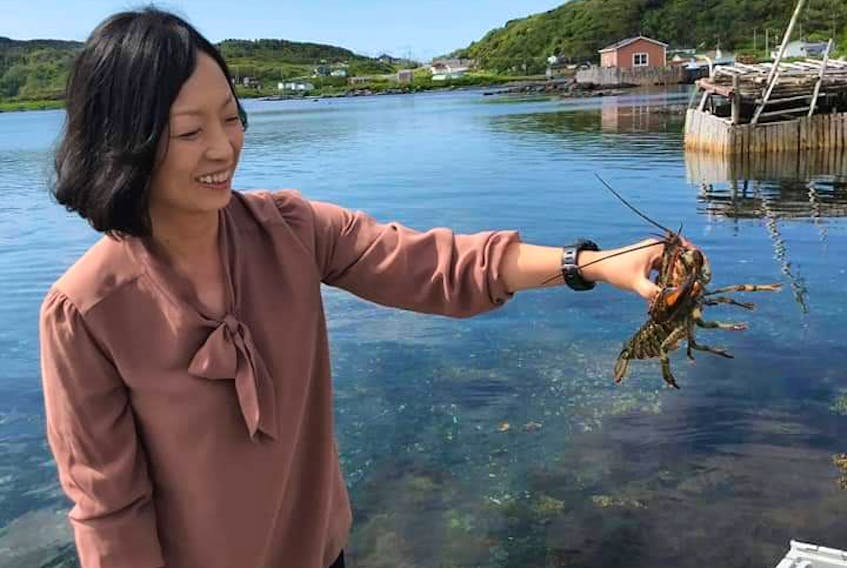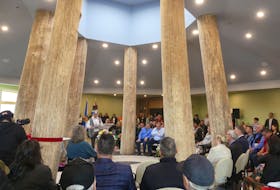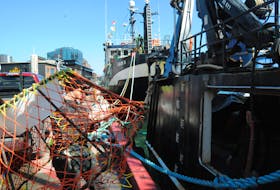ST. JOHN'S, N.L. — A university professor from Japan is packing quite a lot into her yearlong sabbatical in Newfoundland, exploring how people in rural parts of the province continue to make a living from the fishery.
Experienced when it comes to meeting people from small fishing communities throughout East Asia, Yinji Li usually finds the people she meets to be friendly, and says Newfoundland has been no exception.
"People say Newfoundlanders, they will cook all day for a neighbour in a crisis," she said. "One day, my research can make things better in fishing communities."
Li is an associate professor with the school of marine science and gechnology at Tokai University in Tokyo. She is a marine social scientist with a background in economics, fisheries science and marine science. Her research generally focuses on small-scale fisheries, looking at coastal fisheries governance, community-based management and capacity-building within the fishing community.

Li has been all over northeast Asia and has found that despite the importance of their work, people involved in the fishery tend to be marginalized. Her research takes a close look at the economic challenges these communities face and the opportunities they can latch onto or make better use of.
Her interest in the fishing industry was sparked by a trip she took as a post-secondary student to a fishing community in Japan, where she got a first-hand look at how people were building tourism opportunities out of local knowledge of the fishery.
"We experienced a lot of fishing stuff — getting on the boat, the thrill of fishing. ... We caught the fish, cooked the fish and that kind of thing," she said. "And we supported them to run their business."
She became aware of Newfoundland and Labrador after learning about a global research project called Too Big to Ignore (TBTI) headquartered in St. John's. This partnership includes Memorial University and is dedicated to small-scale fisheries research. It has created a network of more than 400 members based in 81 countries. Among other subjects, TBTI promotes the concept of blue justice, which acknowledges the level of injustice small-scale fisheries have faced and the ongoing challenges present through poverty, food insecurity, access issues, gender inequity, resource depletion, habitat degradation and inequitable resource allocation.
Japan and Canada, Hokkaido and Newfoundland. Small changes today for Big differences tomorrow.
— Yinji Li(李銀姫) (@li_yinji) January 30, 2020
日本とカナダ、北海道とニューファンドランド。今日の「小」変化は、明日の「大」変化を生み出す。https://t.co/jwRs3WPBZOhttps://t.co/aO06WzgIrc pic.twitter.com/1Rk1Y6IEDE
Li already knew the TBTI project director, MUN geography professor Ratana Chuenpagdee.
"When I had this sabbatical leave, I couldn't think of any place that I'd go, so (Chuenpagdee) agreed to have me here," said Li, who is also a visiting professor at Memorial University.
Chuenpagdee, who is also a professor at MUN's department of geography, appreciates having Li here, noting her own students thoroughly enjoyed it when Li sat in on a world fisheries class as a guest lecturer.
"I think the benefit of having somebody from outside like Yinji and others are really about what they're bringing in terms of their perspective, to help us reflect on how things are here and what would be some of the options in thinking about if you wanted to improve things in our place and what we can learn from other places," she said. "That's what (TBTI) is all about as well."
Raising awareness
While in Newfoundland, Li has laid a foundation for projects she hopes to tackle in the near future. She intends to launch a TBTI project in Japan.
"Japan is known for having a big industrial fishery, but I guess not many people know that Japan has many small-scale fisheries and fishing communities," Li said. "Eighty per cent of the fishermen are engaged in small-scale coast fisheries. This is to raise awareness about the small-scale fisheries of Japan and then get to the research and discuss their role."
Japan's marine ecosystem is extremely diverse when it comes to fish (the country is also among the largest global consumers of fish). Li says shrimp, mackerel and squid are among those commonly harvested through small-scale fisheries.

Since her arrival in Newfoundland last spring, Li has learned a lot about the fishery in rural Newfoundland. The most eye-opening experience and the highlight of her time on the island was her month-long stay on the Great Northern Peninsula.
"I found the small-scale fishing communities ... I felt so much closer, because I found a lot of similarities between Japan and Newfoundland."
Newfoundland and Japan have both grappled with a decline in fishing resources. Similar to what's happened in Newfoundland, Li said a lot of younger people from Japanese fishing communities have not been inclined to follow their families into the same industry. These communities are also aging rapidly.
"There's a lack of vitality in communities. These are the same challenges we're facing in Japan and Newfoundland," she said. "Two countries so far, but so many common things. Very much a lot to share with each, so that's what I'm going to do."
📌@TBTInetwork visiting professor @li_yinji from @Tokai_Univ_ in Japan reflects on her trip to the #fishing #communities of the Great Northern Peninsula, Canada. ⤵️https://t.co/APTU4TTrVf
— Too Big To Ignore (@TBTInetwork) August 22, 2019
At a workshop on the Great Northern Peninsula, Li met with community leaders and harvesters. It was evident to her that people are working to make life better in these communities, and the same can be said for people in fishing communities where she's from, Li said.
Chuenpagdee noted every visiting professor to the province is unique when it comes to how they spend their time in the province, but she was particularly impressed by how keen Li was to connect with communities.
"I thought it was very special," she said. "She's really spending time and making an effort to do that … to keep thinking about what she's seeing here and what she's seeing at home. There's just so much to learn from each other."
THE MEANING OF SMALL😉Good morning. pic.twitter.com/adokn0SnA2
— Yinji Li(李銀姫) (@li_yinji) December 6, 2019
Beyond her time spent on the Great Northern Peninsula, Li has enjoyed getting to share this Newfoundland adventure with her nine-year-old daughter. Li got her involved in the Girls Who Fish program, which is part of the Fishing for Success social enterprise project operated in Petty Harbour. It encourages women to get involved in fishing.
"We joined that program, and it seems like we need that program in Japan, too," Li said.
Time is winding down on her year in Newfoundland. Li is set to return to Japan by the end of next month.
"I feel I was meant to be here in Newfoundland," she said. "We confirmed that the things that I'm doing (are) really the things that I want to do. I am really excited about the TBTI Japan launching and I'm also currently applying for funding comparative research between Newfoundland and Japan. I'm excited about that, too."
She is presently preparing for a policy forum to be held at Tokai University in May. Li intends to launch the TBTI Japan network at the same event.
Twitter: @CBNAndrew









